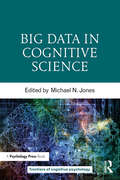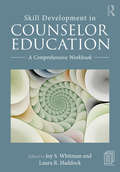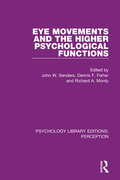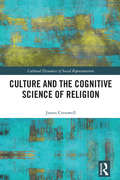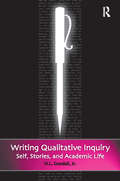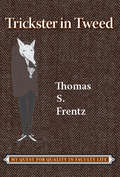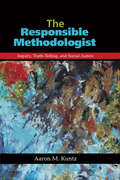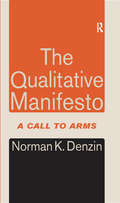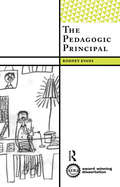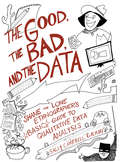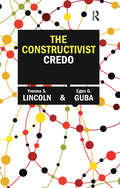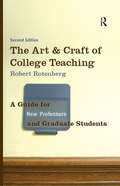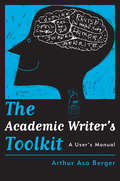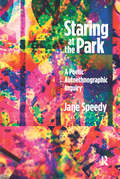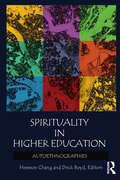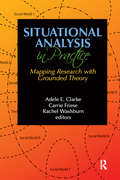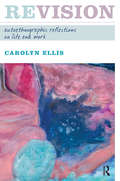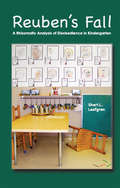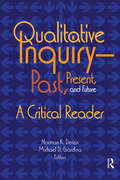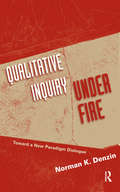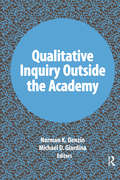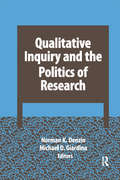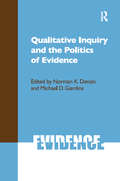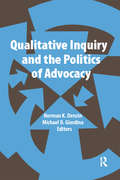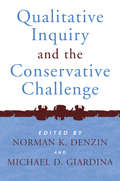- Table View
- List View
Big Data in Cognitive Science (Frontiers of Cognitive Psychology)
by Michael N. JonesWhile laboratory research is the backbone of collecting experimental data in cognitive science, a rapidly increasing amount of research is now capitalizing on large-scale and real-world digital data. Each piece of data is a trace of human behavior and offers us a potential clue to understanding basic cognitive principles. However, we have to be able to put the pieces together in a reasonable way, which necessitates both advances in our theoretical models and development of new methodological techniques. The primary goal of this volume is to present cutting-edge examples of mining large-scale and naturalistic data to discover important principles of cognition and evaluate theories that would not be possible without such a scale. This book also has a mission to stimulate cognitive scientists to consider new ways to harness big data in order to enhance our understanding of fundamental cognitive processes. Finally, this book aims to warn of the potential pitfalls of using, or being over-reliant on, big data and to show how big data can work alongside traditional, rigorously gathered experimental data rather than simply supersede it. In sum, this groundbreaking volume presents cognitive scientists and those in related fields with an exciting, detailed, stimulating, and realistic introduction to big data – and to show how it may greatly advance our understanding of the principles of human memory, perception, categorization, decision-making, language, problem-solving, and representation.
Skill Development in Counselor Education: A Comprehensive Workbook
by Joy S. Whitman Laura R. HaddockSkill Development in Counselor Education provides counselor educators in training with a variety of materials and suggestions to assist in building fundamental skills. Templates, activities, and quizzes guide educators in developing their identities and teaching philosophies, developing engaging curricula, teaching cultural and technological competence, and dealing with complex ethical issues in the classroom. The book also covers a variety of practical topics related to seeking a faculty position or navigating an academic appointment, including writing a CV and cover letter, preparing for interviews, and navigating the tenure process.
Eye Movements and the Higher Psychological Functions (Psychology Library Editions: Perception #26)
by John W. Senders, Dennis F. Fisher and Richard A. MontyOriginally published in 1978, this volume reflects the proceedings of a conference held in February 1977 in California and is a natural successor to the earlier volume Eye Movements and Psychological Processes (Monty & Senders, 1976). The second conference was aimed at providing a greater opportunity for discussing the "higher mental processes" touched on in the first volume. Part 1 is devoted to an intensive review of the underlying processes and psychological functions of eye movements. It includes discussions of the relationships of cortical and subcortical visual areas to eye movements and visual processing associated with them; information about the position of the eye in the head and the perception of visual space; saccades and visual functioning; and masking. In further parts it goes on to look at: methodology and models; cognitive processes; reading processes; looking at static and dynamic display; and finally chapters on problems and applications.
Culture and the Cognitive Science of Religion (Cultural Dynamics of Social Representation)
by James CresswellCulture and the Cognitive Science of Religion is the first book to bring together cultural psychology and the cognitive science of religion (CSR). Containing much-needed discussion of how good research should do more than simply follow methodological prescriptions, this thought-provoking and original book outlines the ways in which CSR can be used to study everyday religious belief without sacrificing psychological science. Cresswell’s pragmatist approach expands CSR in a radically new direction. The author shows how language and culture can be integrated within CSR in order to achieve an alternative ontogenetic and phylogenetic approach to cognition, and argues that a view of cognition that is not based on modularity, but on the dynamic connection between an organism and its milieu, can lead to a view of evolution that makes much more room for the constitutive role of culture in cognition. As a provocative attempt to persuade researchers to engage with religious communities more directly, the book should be essential reading for academics, researchers and postgraduate students, as well as psychologists interested in the cognitive science of religion, theological anthropology, religious studies and cultural anthropology.
Writing Qualitative Inquiry: Self, Stories, and Academic Life (Writing Lives: Ethnographic Narratives #6)
by H.L. Goodall JrResponding to the rapid growth of personal narrative as a method of inquiry among qualitative scholars, Bud Goodall offers a concise volume of practical advice for scholars and students seeking to work in this tradition. He provides writing tips and strategies from a well-published, successful author of creative nonfiction and concrete guidance on finding appropriate outlets for your work. For readers, he offers a set of criteria to assess the quality of creative nonfiction writing. Goodall suggests paths to success within the academy—still rife with political sinkholes for the narrative ethnographer—and ways of building a career as a public scholar. Goodall’s work serves as both a writing manual and career guide for those in qualitative inquiry.
Trickster in Tweed: The Quest for Quality in a Faculty Life (Writing Lives: Ethnographic Narratives)
by Thomas S FrentzHow do academics survive the bureaucracy, the petty jealousies, the absurdities of operating in the university? More important, how do they, as humans, cope with the darker shadows that enter professional lives-- illness, sorrow, death? Coyote, The Trickster, a well known figure in the American Indian world, is also the icon for communication scholar Tom Frentz. Frentz uses the survival strategies of The Trickster in his articulate, amusing, and often emotional autoethnography of striving for quality through the worlds of academia and medicine.
The Responsible Methodologist: Inquiry, Truth-Telling, and Social Justice
by Aaron M KuntzWhat does it mean to be a responsible methodologist? Certainly it is more than being a research middle-manager who ensures that the tools used in a thesis or dissertation are of the right gauge. In The Responsible Methodologist, leading education scholar Aaron Kuntz uses the latest movements in social theory to challenge qualitative researchers to reconceptualize their work away from the technocratic toward an intervention, an ethical disruption of the norm, an activist stance toward progressive social change. Inviting creativity and vision, he insists that the responsible methodologist become a force leading the discourse toward social justice. His book-challenges the technocratic role given to qualitative methodologists in university settings;-urges them to become a force for change through Foucault's parrhesia, risky truth-telling;-includes research projects that have incorporated this vision.
The Qualitative Manifesto: A Call to Arms
by Norman K. DenzinNow issued as part of the Routledge Education Classic Edition series, A Qualitative Manifesto provides a "call to arms" for researchers from the leading figure in the qualitative research commnunity, Norman Denzin. Denzin asks for a research tradition engaged in social justice, sensitive to identity and indigenous concerns, brave to risk presentation in forms beyond traditional academic writing, and committed to teaching this to their students and colleagues. A new preface text by the author reflects on the changes in research, society and in social justice since the publication of the original edition. Denzin looks to the past, present and future of the field, underlining the continuing importance of this brief, provocative book.
The Pedagogic Principal (International Institute for Qualitative Methodology Series)
by Rodney EvansUsing an innovative research strategy including empirical, interpretive, and narrative strands, Rod Evans reorients studies of educational administration that have been dominated by organizational theory originating in the world of industry and commerce. Building on a foundation of pedagogical and phenomenological inquiry, he examines administrators’ concrete, lived experience, or “lifeworld practice.” In reconstituting educational administration as pedagogical practice, Evans draws conclusions with profound implications for schools and administrators of every stripe.
The Good, the Bad, and the Data: Shane the Lone Ethnographer’s Basic Guide to Qualitative Data Analysis
by Sally Campbell PirieData analysis is often the most difficult task facing students and novice qualitative researchers, including Shane the Lone Ethnographer—a grad student with fond visions of the Wild West—and her horse Transcriptor. In this comic-style textbook, we follow Shane as she attempts to corral her data and make sense of it for publication. Shane learns how to read, sort, code, write, and assess the analysis of a qualitative study in the traditions of ethnography, grounded theory, discourse, and narrative analysis. Along the trail, she receives helpful advice from experienced researchers who explain their analytic practices in detail. Written in a friendly, comic book style, Shane’s Wild West adventures in data analysis will be both instructive and an enjoyable read.
The Constructivist Credo
by Yvonna S Lincoln Egon G GubaThe Constructivist Credo is a set of foundational principles for those wishing to conduct social science research within the constructivist paradigm. They were distilled by Yvonna Lincoln and Egon Guba from their many writings on this topic and are provided in the form of 150 propositional statements. After Guba’s death in 2008, the Credo was completed by Lincoln and is presented here. In addition to the key principles of constructivist thought, the volume also contains an introduction to constructivism, an intellectual biography and complete bibliography of Guba’s work, and a case study using constructivism, showing how the paradigm can be applied to a research study.
The Art and Craft of College Teaching: A Guide for New Professors and Graduate Students
by Robert RotenbergThe second edition of Rotenberg’s popular guide to college teaching includes additional material on teaching in a digital environment, universal design, and teaching diverse students. As in the first edition, the book provides a hands-on, quick-start guide to the complexities of the college classroom for instructors in their first five years of teaching independently. The chapters survey the existing literature on how to effectively teach young adults, offering specific solutions to the most commonly faced classroom dilemmas. The author, a former department chair and award-winning instructor, encourages the new teacher to support their students as individual learners who are engaged in a program of study beyond their individual class. A focus on the choices made during the design of the course helps the instructor coordinate their class with a department or college curriculum. An extensive discussion of the relationship between classroom design and class size, as well as tips of assessment and grading, enable the new instructor to better handle the challenges of contemporary college classrooms.
The Academic Writer's Toolkit: A User’s Manual
by Arthur Asa BergerBerger’s slim, user-friendly volume on academic writing is a gift to linguistically-stressed academics. Author of 60 published books, the author speaks to junior scholars and graduate students about the process and products of academic writing. He differentiates between business writing skills for memos, proposals, and reports, and the scholarly writing that occurs in journals and books. He has suggestions for getting the “turgid” out of turgid academic prose and offers suggestions on how to best structure various forms of documents for effective communication. Written in Berger’s friendly, personal style, he shows by example that academics can write good, readable prose in a variety of genres.
Staring at the Park: A Poetic Autoethnographic Inquiry (Writing Lives: Ethnographic Narratives #16)
by Jane SpeedyWinner of the 2016 ICQI Outstanding Qualitative Book Award Acclaimed qualitative scholar Jane Speedy’s world was upended completely after suffering a severe stroke when only in her late 50s. After returning home from the hospital, Speedy took to her iPad to write and draw as a way of making sense of her experience and to aid her recovery. The stunning, fragmented, poetic text and images comprising Staring at the Park depict the events of this difficult journey. It provides an alternative model of engaging the self in a research project in an evocative and artistic way. This highly original book: -uses the seemingly ordinary motif of the park opposite the author’s house as the catalyst for a wildly creative autoethnography;-includes three narratives of the author’s experience of staring at the park—an imagined murder mystery in the park, a realist ethnography of the park, and the life story (both imagined and real) of her facing her illness and recovery; -offers readers a poetic and performative inquiry into the author’s new reality.
Spirituality in Higher Education: Autoethnographies
by Heewon Chang Drick BoydThis collection of articles explores how a wide range of academics-- diverse in location, rank and discipline-- understand and express how they deal with spirituality in their professional lives and how they integrate spirituality in teaching, research, administration, and advising. The contributors also analyze the culture of academia and its challenges to the spiritual development of those involved. Twenty chapter authors--from a variety of faith traditions--discuss the ways in which their own beliefs have affected their journeys through higher education. By using an autoethnographic, self-analytical lens, this collection shows how various spiritualities have influenced how higher education is understood, taught and performed. The book will stimulate debate and conversations on a topic traditionally ignored in academia
Situational Analysis in Practice: Mapping Research with Grounded Theory
by Adele E Clarke Carrie Friese Rachel WashburnSituational Analysis creates analytic maps of social processes and relationships identified using grounded theory. Creator of the method, award-winning sociologist Adele E. Clarke and two co-editors show how the method can be, and has been, used in a variety of critical qualitative studies. The book-Updates the basic concepts and methods of situational analysis, a methodology created by Clarke;-Provides five important case studies of its use in a variety of health and educational settings;-Offers reflections from the original researchers on the studies and their impact;-Includes lists of published articles and available websites focused on situational analysis.
Revision: Autoethnographic Reflections on Life and Work (Writing Lives: Ethnographic Narratives #8)
by Carolyn EllisCarolyn Ellis is the leading writer in the move toward personal, autobiographical writing as a strategy for academic research. In addition to her landmark books Final Negotiations and The Ethnographic I, she has authored numerous stories that demonstrate the emotional power and academic value of autoethnography. This volume collects a dozen of Ellis’s stories—about the loss of her husband, brother and mother; of growing up in small town Virginia; about the work of the ethnographer; about emotionally charged life issues such as abortion, caregiving, and love. Atop these captivating stories, she adds the component of meta-autoethography—a layering of new interpretations, reflections, and vignettes to her older work. An important new work for qualitative researchers and a student-friendly text for courses.
Reuben's Fall: A Rhizomatic Analysis of Disobedience in Kindergarten (International Institute for Qualitative Methodology Series #12)
by Sheri L LeafgrenThis study offers a lens on two kindergarten classrooms, examining moments of disobedience as children interacted with children, their teachers, and the space and time elements of the classroom environments. Through Eisner’s educational criticism, author Sherry Leafgren also examines the elements of school, kindergarten and teachers within the spaces of their intersections with the children. While past research has directed our attention to addressing the problem of classroom disobedience, Leafgren provides an opportunity and means to view these familiar actions through fresh lenses of possibilities. Predicated by an event in the researcher’s teaching life, she utilizes Deleuze and Guattari’s rhizoanalysis to openly seek lateral paths of understanding by linking and folding the findings with texts other than those that would be normally used toward developing new understandings and questions regarding children’s disobediences. An earlier version of this book was awarded the distinguished dissertation award from the International Institute for Qualitative Methodology.
Qualitative Inquiry—Past, Present, and Future: A Critical Reader
by Norman K Denzin Michael D GiardinaIn this critical reader, the best writing of two dozen key figures in qualitative research is gathered together to help students to identify emerging themes in the field and the latest thinking of the leaders in qualitative inquiry. These groundbreaking articles are pulled from a decade of social justice-focused plenary volumes emanating from the annual International Congress of Qualitative Inquiry. These are the ideas that have helped shape the landscape of the field over the past decade. This work-brings together the latest work of 25 leading figures in qualitative research from 4 continents;-addresses the central themes of the field over the past decade in theory, methodology, politics, and interventions;-includes contextualizing essays by the volume editors, who direct the Congress.
Qualitative Inquiry Under Fire: Toward a New Paradigm Dialogue
by Norman K DenzinThis collection of recent works by Norman K. Denzin provides a history of the field of qualitative inquiry over the past two decades. As perhaps the leading proponent of this style of research, Denzin has led the way toward more performative writing, toward conceptualizing research in terms of social justice, toward inclusion of indigenous voices, and toward new models of interpretation and representation. In these 13 essays—which originally appeared in a wide variety of sources and are edited and updated here—the author traces how these changes have transformed qualitative practice in recent years. In an era when qualitative inquiry is under fire from conservative governmental and academic bodies, he points the way toward the future, including a renewed dialogue on paradigmatic pluralism.
Qualitative Inquiry Outside the Academy (International Congress of Qualitative Inquiry Series #9)
by Norman K. Denzin Michael D. GiardinaThis volume of plenary addresses and other key presentations from the 2013 International Congress of Qualitative Inquiry shows how scholars convert inquiry into spaces of advocacy in the outside world. The original chapters engage in debate on how qualitative research can be best used to advance the causes of social justice while addressing racial, ethnic, gender, and environmental disparities in education, welfare, and health care. Twenty contributors from six countries and multiple academic disciplines present models, cases, and experiences to show how qualitative research can be used as an effective instrument for social change. Sponsored by the International Congress of Qualitative Inquiry.
Qualitative Inquiry and the Politics of Research (International Congress of Qualitative Inquiry Series #10)
by Norman K Denzin Michael D GiardinaThis volume of plenary addresses and other key presentations from the 2014 International Congress of Qualitative Inquiry highlights the politics of research in the neoliberal state and the role of qualitative researchers in that debate. Marginalized by an increasingly top-down, assessment-driven university system, the fifteen contributors from a variety of disciplines show the responses of qualitative scholars in their research, writing, advocacy, and teaching, both inside the university and in the broader society. Sponsored by the International Congress of Qualitative Inquiry.
Qualitative Inquiry and the Politics of Evidence (International Congress of Qualitative Inquiry Series)
by Norman K. Denzin Michael D. GiardinaWhat is evidence in qualitative inquiry and how is it evaluated? What is true or false in research is strongly influenced by socially defined criteria and by the politics of academia. In providing an alternative to conservative science, qualitative researchers are often victimized by these politics. The use of qualitative evidence within the policy arena is also subject to social and political factors. Within qualitative inquiry itself, evidence is defined differently in different discourses—law, medicine, history, cultural, or performance studies. The interdisciplinary, international group of contributors to this volume address these questions in an attempt to create evidential criteria for qualitative work. Sponsored by the International Center for Qualitative Inquiry.
Qualitative Inquiry and the Politics of Advocacy (International Congress of Qualitative Inquiry Series)
by Norman K. Denzin Michael D. GiardinaThe plenary volume from the Seventh International Congress of Qualitative Inquiry (2011) examines the politics of advocacy and the context in which scholars are encouraged to pursue social justice agendas, be human rights advocates, and do work that honors the core values of human dignity and freedom from fear and violence. Contributions from many of the world's leading qualitative researchers in communications, education, sociology, and related disciplines address topics including community research, transformative education, and researcher ethics, and guide the field toward an engaged, activist research agenda.
Qualitative Inquiry and the Conservative Challenge (International Congress of Qualitative Inquiry Series)
by Norman K. Denzin Michael D. GiardinaThis volume is a call to qualitative researchers to respond to the political and methodological conservativism of the new millennium. Based upon the plenary papers at the first International Congress on Qualitative Inquiry, 22 scholars from five countries and many academic disciplines address how qualitative inquiry can maintain its forward-looking agenda, its emphasis on ethical practice, and its stance in favor of social justice in a world where conservatives aggressively control the political system, the university, and grant agency purse strings. Contributions by such noted scholars as Patti Lather, Janice Morse, Linda Tuhiwai Smith, Ernest House, Yvonna Lincoln, and H.L. Goodall, Jr. make this an important benchmark work for all involved in qualitative inquiry.
